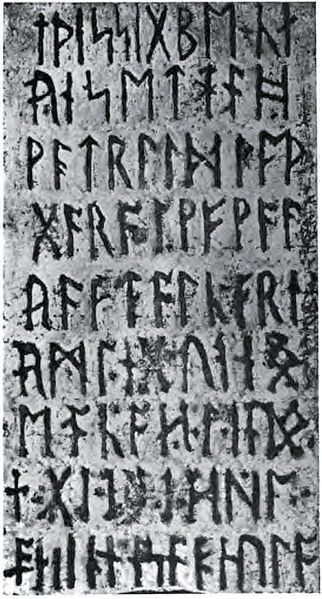Writing English in Runes for Magical Purposes
 Runes can be used in two ways for marking spells on something. Their most obvious use is their own intrinsic symbolism, which can be combined in bind runes to create a more complex meaning. However, you can also spell out actual English words in runes, and this will give the markings a certain amount of power. Which is more effective will vary with the situation. For instance, for keeping something cold, there's no point in writing out "cold" in runes when you can just use the Rune of Ice. On the other hand, if you're putting a complex multi-part blessing on something that you want specifically worded, then you'd better resort to sentences.
Runes can be used in two ways for marking spells on something. Their most obvious use is their own intrinsic symbolism, which can be combined in bind runes to create a more complex meaning. However, you can also spell out actual English words in runes, and this will give the markings a certain amount of power. Which is more effective will vary with the situation. For instance, for keeping something cold, there's no point in writing out "cold" in runes when you can just use the Rune of Ice. On the other hand, if you're putting a complex multi-part blessing on something that you want specifically worded, then you'd better resort to sentences.
The problem is that modern English doesn't always write well in runes. It writes even less well in traditional Futhark runes, which is why if you are intending to write English in runes, I strongly suggest that you learn the Futhorc runes, even if you never use them for anything other than their linguistic value. Futhorc runes, being closer to Anglo-Saxon, are better for writing English than are the runes of the Norse languages, from which our tongue split millennia ago.
If you want to use Futhark, one course of action is to write not in English, but actually in one of the Scandinavian tongues - Swedish, Norwegian, or Danish. It will also work reasonably well for German. Modern Icelandic is very close to Old Norse, so it would work exceptionally well. If you want to be extra authentic - and yes, the authenticity does add a certain amount of oomph - you can research Old Norse or Old Germanic. However, this may be too much work for most people who simply want to throw a line on something with a magic marker, and who would prefer to work in their native language.
Some of the words in English are Anglo-Saxon in origin (although even they have changed phonetically over the years), but many, if not most, are borrowed, usually from Latin- derived languages. These borrowings don't have the same phonetic group as the Futhorc, much less the Futhark. The way that I've chosen to compromise is this:
1. Try to use as many Angle-Saxon-derived words as possible. Use borrowed words only when there's no other choice. For example, I was trying to write "cycle of the year", and getting bogged down on how to spell out "cycle". This is actually a Greek-derived word, and the idea that C can make both S and K noises, even in the same word, is a later corruption. After half an hour of agonizing over whether to spell it phonetically ("sykle") or letter-for-letter ("kykle"), I asked myself about how it might have been phrased before the word "cycle" came into the English tongue. What popped into my head was "the round of the year". Round was a word that I could spell easier, so I used that wording instead.
2. When you do have to use Latin or Greek-derived words, write them phonetically.
3. When you use Anglo-Saxon derived words, you can write them phonetically if you want, but I find that it works best magically if you write them phonetically for their original pronunciation. For example, the word "one" is pronounced "wun" today, so theoretically we could write it WUN - Wyn, Uruz, Nyth - but it used to be pronounced just like it's spelled - "oh- neh". I spell it Os Nyth Ehwaz, just like it's written, and this seems to fit better.
This brings us to the problem of knowing how the words were actually pronounced. It's perhaps better to do some linguistic research, or bother some scholars, than to guess and assume you know how things were pronounced. On the other hand, the problem with dead languages and dialects is that it's damn hard for us to be sure how things were pronounced anyway, and it may be a matter of your guess versus some professor's guess. However, some rules are simple to remember. Our silent "e" at the end of words was once pronounced, just as it is in modern German, so it's perfectly fine to leave the Ehwaz at the end of the word. That will also help to make the word recognizable to others, and to you years later when you've forgotten what you wrote.
Writing any word in runes will give it extra magical meaning; that's part of their particular power. It's one of the simplest ways to enspell something, because even if you're lousy at sticking power and energy into something, the runes have a power of their own and will do it for you to an extent. People who are psychically blind and deaf can use the runes in this way, and have decent results. It's classic theurgic magic; the gift of Odhinn and the Norns.

